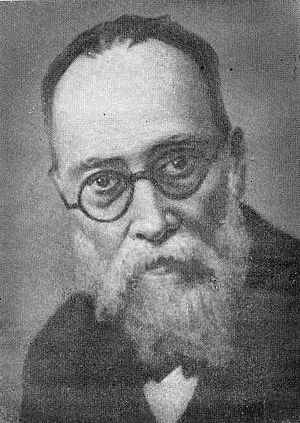Antoine Meillet facts for kids
Quick facts for kids
Antoine Meillet
|
|
|---|---|
 |
|
| Born |
Paul Jules Antoine Meillet
11 November 1866 Moulins, France
|
| Died | 21 September 1936 (aged 69) Châteaumeillant, France
|
| Nationality | French |
| Alma mater | University of Paris |
| Institutions | Collège de France, Institut national des langues et civilisations orientales, |
|
Main interests
|
Comparative Linguistics, Armenian linguistics, Philology |
|
Notable ideas
|
Epithets in Homer, Meillet's law |
|
Influences
|
|
|
Influenced
|
|
Paul Jules Antoine Meillet (11 November 1866 – 21 September 1936) was a very important French linguist (someone who studies language). He was born in Moulins, France, and passed away in Châteaumeillant.
Meillet started his studies at the Sorbonne University. There, he was taught by famous thinkers like Michel Bréal and Ferdinand de Saussure. In 1890, he traveled to the Caucasus region to study the Armenian language. When he came back, he continued teaching about how languages compare to each other.
In 1897, Meillet earned his doctorate degree. His research was about how certain grammar rules worked in Old Slavonic. Later, in 1902, he became a professor of Armenian at a special school for oriental languages. He also mentored Hrachia Adjarian, who became a key figure in Armenian language studies.
In 1905, Meillet joined the famous Collège de France. He taught there about the history and structure of Indo-European languages. These are a large family of languages spoken across Europe and parts of Asia. He once famously said that if you want to hear how ancient Indo-Europeans might have sounded, you should listen to a Lithuanian peasant.
Antoine Meillet is remembered for guiding many future linguists. These students became very important in French language studies. He also helped start the Revue des études slaves in 1921, a journal about Slavic studies.
How Languages Change
Meillet is well-known for his work in historical linguistics. This field looks at how languages change over time. He helped create the idea of grammaticalization. This is when regular words slowly turn into grammar tools. For example, a word like "will" (meaning desire) can become a way to show future tense. This idea is still discussed by linguists today.
Studying Ancient Greek Poems
At the Sorbonne, Meillet guided Milman Parry starting in 1924. Meillet believed that ancient Greek poems, like the Iliad, were made of repeated phrases. These phrases were passed down from one poet to another. He thought this was a special way that poems were created when they were spoken aloud, not written down.
Meillet suggested that Parry should study how people tell stories today. He wanted Parry to see if living oral traditions also used these repeated phrases. He introduced Parry to a scholar who studied heroic poems in Serbo-Croatian in Bosnia. Parry's research there, using recordings, changed how we understand ancient Greek poetry.
International Languages
Meillet also believed in using an international auxiliary language. This is a language designed to help people from different countries communicate. He thought that Esperanto, a well-known constructed language, was working well. He also advised the International Auxiliary Language Association. This group later created Interlingua, another international language.
Works
- 1903: Introduction to the Comparative Study of Indo-European Languages.
- 1908: The Indo-European Dialects.
- 1913: Overview of the History of the Greek Language.
- 1917: General Characteristics of the Germanic Languages.
- 1921: Historical Linguistics and General Linguistics.
- 1924: The Languages of the World (with Marcel Cohen).
- 1925: The Comparative Method in Historical Linguistics.
- 1932: Etymological Dictionary of the Latin Language.
See Also
 In Spanish: Antoine Meillet para niños
In Spanish: Antoine Meillet para niños
- Meillet's law
- Pierre Chantraine
 | Emma Amos |
 | Edward Mitchell Bannister |
 | Larry D. Alexander |
 | Ernie Barnes |

